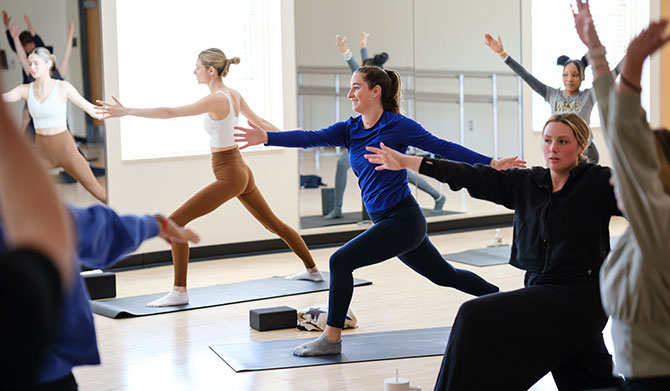B.S. in Health and Exercise Science
Program Overview
The Department of Health and Exercise Science (HES) offers a program leading to a Bachelor of Science degree in Health and Exercise Science. The course of study is designed to prepare individuals for careers in medicine and allied health, such as preventive and rehabilitative programs or for further graduate study in the health sciences. The majority of our students pursue careers as physicians, physical therapists, physician assistants, nurses, occupational therapists, and nutritionists.
Others pursue further education and careers in dentistry, public health, exercise physiology, health psychology, and biomechanics. The curriculum provides a clinical perspective to the sciences with hands-on experiences available through research and internships.
Program requirements
Students must complete 31 hours to complete the requirements for the major. Of these 31 hours, 29 hours are from the 10 required core courses listed below:
- HES 262: Statistics in the Health Sciences (fall and spring) (3 hours)
- HES 312: Exercise & Health Psychology (fall and spring) (3 hours)
- HES 350: Human Physiology (fall and spring) (3 hours)
- HES 350L: Human Physiology Lab (fall and spring) (1 hour)
- HES 351: Nutrition in Health and Disease (fall and spring) (3 hours)
- HES 352: Human Gross Anatomy (fall and spring) (4 hours)
- HES 353: Physiology of Exercise (fall and spring) (3 hours)
- HES 354: Applied Human Physiology Lab (fall and spring) (3 hours)
- HES 360: Epidemiology (fall and spring) (3 hours)
- HES 370: Biomechanics of Human Movement (fall and spring) (3 hours)
Two additional hours are needed from designated courses offered in HES and other departments across the college. These include:
- HES 232: Emergency Medical Training (3 hours)
- HES 310: Clinical Externship (1 or 2 hours)
- HES 311: Clinical Internship (1 or 2 hours)
- HES 362: Experimental Design (3 hours)
- HES 372: Anatomy Dissection Laboratory (2 hours) (Selected by anatomy professors)
- HES 375: Advanced Physiology of Exercise (3 hours)
- HES 376: Interventions in Behavioral Medicine (3 hours)
- HES 382: Individual Study (1-2 hours)
- HES 384: Special Topics in Health & Exercise Science (1.5 – 3 hours)
- HES 386: Honors Research (2 hours)
- HES 388: Field Internship in Health Sciences (3 hours)
Cross-Discipline Courses
- ANT 360: Anthropology of Global Health (3 hours)
- ANT 362: Medical Anthropology (3 hours)
- BIO 345: Neurobiology (3 hours)
- BIO 353: Functional Neuroanatomy (3 hours)
- BIO 359: Genomics (3 hours)
- BIO 362: Immunology (3 hours)
- BIO 363: Sensory Biology (3 hours)
- BIO 365: Biology of the Cell (3 hours)
- BIO 367: Virology (3 hours)
- BIO 370: Biochemistry: Macromolecules and Metabolism (3 hours)
- BIO 372: Molecular Biology (3 hours)
- CHM 370: Biochemistry: Macromolecules and Metabolism (3 hours)
- CHM 373: Biochemistry: Protein and Nucleic Acid Structure and Function (3 hours)
- CNS 334: Ethics in Health and Human Services (3 hours)
- CNS 335: Health and Human Services in a Diverse Society (3 hours)
- CNS 337: Skills in Human Services (3 hours)
- CNS 340: Professional Orientation to Health and Human Services (3 hours)
- COM 356: Health Communication: Patient-Provider (3 hours)
- COM 357: Health Communication Campaigns (3 hours)
- COM 358: Health Communication and Bioethics (3 hours)
- COM 370: Special Topics: Communicating for Health Behavior Change (3 hours)
- ECN 240: Economics of Health and Medicine (3 hours)
- HMN 390: Interdisciplinary Seminar on Aging (3 hours)
- HPA 150: Introduction to Public Health (3 hours)
- MTH 256: Statistical Models (3 hours)
- MTH 257: Design and Sampling (3 hours)
- PHI 161: Introduction to Bioethics (3 hours)
- PHI 368: Concepts of Health and Disease (3 hours)
- PHI 373: Philosophy of Science (3 hours)
- PSY 241: Developmental Psychology (3 hours)
- PSY 243: Biopsychology (3 hours)
- PSY 322: Psychopharmacology (3 hours)
- SOC 335: Sociology of Health and Illness (3 hours)
- SOC 336: Sociology of Health Care (3 hours)
- WGS 321: Research Seminar: Women’s Health Issues (3 hours)
Additionally, Biology 150/150Lab and Chemistry 111/111 lab are co-requirements for the degree.

Apply to WFU
Ready to apply to Wake Forest? Visit our undergraduate admissions site for details on how to get started.

Program Highlights
Information on courses, clubs and organizations, practical experience and skills, and more for those interested in studying Health & Exercise Science.
